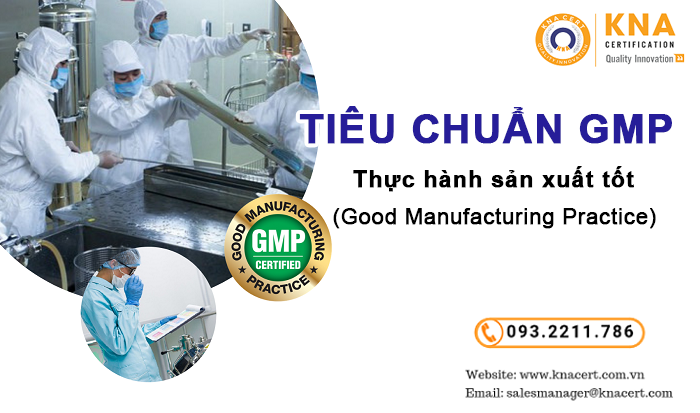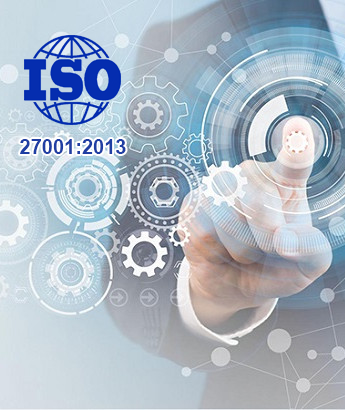Thanks to the whole manufacturing process including many parts and various stages, products are created. To reach high quality, all parts and stages must meet standards and be meticulous. Applying GMP effectively at first helps to control and reduce risks.
GMP is one of compulsory standards enterprises must comply. GMP mentions all aspects of production and controls quality of products especially medicine. What is GMP?

Introduction of GMP - Good Manufacturing Practice (GMP)
GMP stands for Good Manufacturing Practices (Sản xuất thực hành tốt). This system embraces general regulations and instructions to ensure the safe production at factory and high quality products.
This is the most basic set of standards in food industry and a condition of development to higher management system like HACCP, ISO 22000.
Ministry of Health issued Decision No. 3886/2004 / QD-BYT on the application of principles and standards of "Good medicine manufacturing practices" to Western medicines in 2004. All enterprises in charge of medicine production must meet GMP - WHO to the end of 2010.
Who need(s) to apply GMP standard?
According to Ministry of Health regulations, GMP is compulsory for enterprises that manufactures and processes products must fulfil requirements of food hygiene like:
- Food
- Medicine
- Cosmetics
- Medical Equipment
Benefits of GMP application to enterprise's production:
WTO involvement forces member states to comply with general rules. Because of an increase in market share competition, meeting GMP-WHO standards is necessary for enterprises to reap benefits, for examples:
- GMP helps enterprises to demonstrate their business and safe food.
- GMP allows enterprises to easily integrate with higher quality management systems like HACCP, ISO 22000, etc.
- GMP helps to develop consumers' confidence then enterprise's reputation will be improved, which facilitates food, medicine production into competitive markets.
- GMP enables enterprises to enhance their competitiveness to their foreign goods.
- GMP's support will be available if there is the authority or stakeholders' assessment.
GMP benefits to customers:
Food market faces numerous challenges in parallel with an increase in food insecurity. In terms of groups of drugs, particularly functional foods are still not controlled and there are no timely measure.
A set of GMP standards requires testing and experiment of production factors to ensure the safety and effectiveness of medicine supplied to market. If enterprises meet GMP from production scale, facility, workshop, human resources, management process, consumers can be assured of using products.
GMP sets out the following requirements:
- Personnel requirement: Good Manufacturing Practices establishes working positions to recruit candidates who are appropriate to the universal competence, particularly direct production staff. Concentrate on developing training plan, professional training plan for workers.
- Requirements of house and workshop design and building and processing equipment setting: Enterprises need to issue regulations of factory, processing workshop building such as location, design, suitable materials.
- Requirements of workshop and environment hygiene control: Enterprises need to establish regulations concerning chemical and waste treatment, additives and preservatives as well as personal, environment and workshop sanitation.
- Requirements of processing stage control: Enterprises need to have regulations on building processing methods, procedures, specific work instructions and standards of raw materials, products, preparation formulas and inspection methods as well as supervision.
- Requirements of storage and distribution control: Enterprises should make requirements for transportation and storage to prevent finished products from being contaminated by physical, chemical, microbiological agents, etc. to resolve customer complaints and recall faulty products.
GMP mentions all the minimum physical facilities to ensure the hygienic quality of food processing, pharmaceuticals and cosmetics. Enterprises that successfully apply GMP will help your unit to create high quality and safer products.
8 principles of Quality Management:
- The first principle: Customer-oriented
- The second principle: Role of leaders
- The third principle: Universal involvement
- The fourth principle: Process approach
- The fifth principle: System method
- The sixth principle: Continuous improvement
- The seventh principle: Event-related decision
- The eighth principle: Mutual benefits through cooperation with vendors.
GMP implementation steps:
- Necessary documents of GMP implementation:
- - Provisions of the current law.
- - Standards of materials, products and technical manipulation requirements.
- - Demands, customer's feedbacks.
- - New scientific information.
- - Hands-on experience of enterprises.
- - Result of research/ sample test.
- Determine the scope of GMP application.
- Make a plan and assign individuals work.
- - Establish procedures, regulations, standards of each stage.
- Train employees.
- Test application, verification.
- - Modify equipment, workshops, train workers if any inappropriate.
- - Approve official application.
- Supervise the implementation: assess efficiency and improvement.
- Information for ISO 45001:2018 Training contact: KNA Certification Co., Ltd.
- Main headquarters: 11th floor, Ladeco Building, 266 Doi Can Street, Ba Dinh District, Ha Noi.
- Branch: 2nd floor, Thuy Loi 4 Building, 102 Nguyen Xi Street, Ward 26, Binh Thanh District, Ho Chi Minh City.
- Tell: 02438.268.222 - 02438.268.222
- Email: salesmanager@knacert.com Website: www.knacert.com.vn


